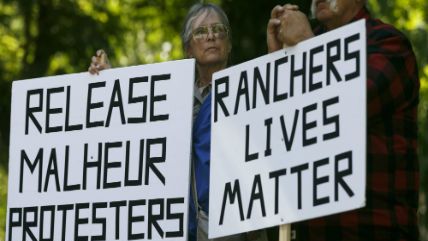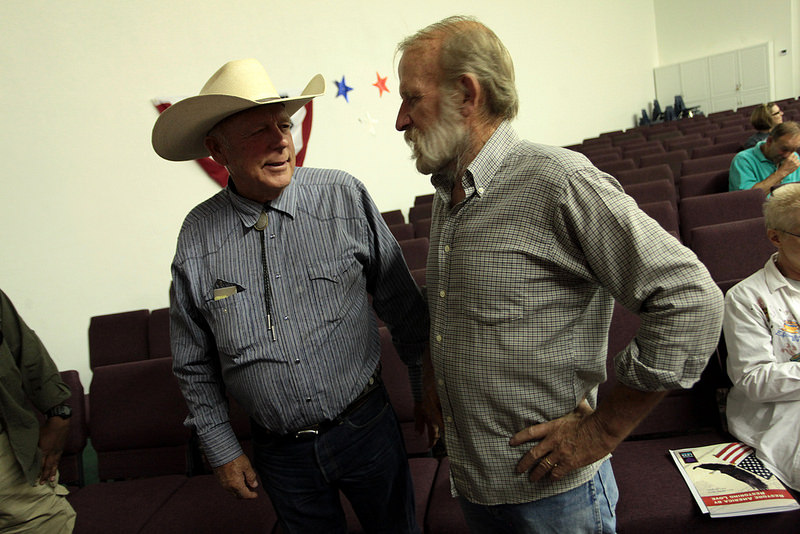Seven Occupiers of Oregon's Malheur Wildlife Refuge Acquitted on All Charges

An Oregon jury today acquitted seven people being tried for their roles in the occupation of the Malheur National Wildlife Refuge earlier this year.

All seven were facing charges for conspiring to impede federal employees through intimidation, threat or force. Four had additional charges of having guns in a federal facility, and two were charged with theft of government property.
Among the acquitted were two sons of Cliven Bundy, famous for his role in an armed standoff with federal agents in Nevada over disputes on grazing fees the Bureau of Land Management insisted he owed. (Bundy himself was arrested in February over that 2014 incident, and a trial is ahead.)
The defendants were: Ammon and Ryan Bundy, Jeff Banta, Shawna Cox, David Fry, Kenneth Medenbach, and Neil Wampler.
Seattle Times summed up the background of the case:
In closing arguments that stretched out over two days, prosecutors stressed that the defendants were not being put on trial for their beliefs, and had an absolute right to protest federal government actions. But they argued that the defendants' actions stepped over the line into a criminal conspiracy to occupy the refuge and — through the use of armed guards and other acts of intimidation — keep federal employees away from their offices south of Burns.
Bundy, in testimony on his own behalf, called the takeover a "hard stand" against the return to prison of two Oregon ranchers, Dwight Hammond Jr. and his son Steven Hammond, after a federal judge ruled that they had not served long enough sentences on arson charges.
The takeover ended peacefully as the last four occupiers surrendered on Feb. 11, but before that, on Jan. 26, LaVoy Finicum, a folksy, articulate rancher who had emerged as a spokesman for the movement, was shot to death by law-enforcement officials.
Among others arrested in connection with the case, 11 pled guilty earlier and others face their own trials ahead in February. More details on the earlier guilty pleas from Oregon Live.
Oregon Live's report from today, mostly written before re-deliberation in the case began this morning.
Oregon Public Broadcasting, which has been covering the case extensively, summed up the arguments:
The government relied heavily on testimony from law enforcement, including Harney County Sheriff David Ward, as well as dozens of FBI agents who responded to the occupation or processed evidence at the Malheur refuge after the occupation ended.
"At the end of the day, there is an element of common sense that demonstrates the guilt of these defendants," Assistant U.S. Attorney Ethan Knight said during his closing arguments during the trial. "These defendants took over a wildlife refuge and it wasn't theirs."
….the defense sought to make its case about a political protest – one about protesting the federal government's ownership and management of public lands.
"The people have to insist that the government is not our master; they are our servants," Ryan Bundy said during his closing statement to the jury.
Some interesting elements of the trial as it unfolded:
• A juror was replaced by an alternate and deliberations began from scratch this week, after a juror sent a note to the judge asking: "Can a juror, a former employee of the Bureau of Land Management, who opens their remarks in deliberations by stating 'I am very biased' be considered an impartial judge in this case?"
• One of the defense lawyers was tased and arrested in court today, according to the Seattle Times:
Ammon Bundy's attorney Marcus Mumford argued his client should be released from confinement while U.S. District Court Judge Anna Brown said he must be returned to the custody of federal marshals since he still faced charges in Nevada.
Mumford's protests in the Portland courtroom grew louder and louder until he was finally tackled and tased by marshals, according to Cox and another member of the defense's legal team. The judge ordered the courtroom cleared.
• The feds had 15 informants among or in communication with the occupiers.
It's worth remembering the behavior of the agents who shot and killed occupier LaVoy Finicum, who shot at him just as he exited his vehicle and before the notorious "reaching for a gun" motion that many in the public insisted justified the kill.


Show Comments (111)